CHURCHILL CALLS WORLD TO ARMS VS. HITLER
London, England · May 13, 1940
As Adolf Hitler’s armies raced across Europe, seemingly unstoppable, gobbling up country after country for Nazi Germany, and (God forbid) perhaps Britain herself, Winston Churchill on this date in 1940 succeeded a war-weary Neville Chamberlain as prime minister. After a lukewarm reception from fellow Members of Parliament, Churchill uttered one of the greatest calls-to-arms ever: “I have nothing to offer but blood, toil, tears, and sweat,” he told his audience. The policy of his new government was “to wage war, by sea, land and air, with all our might and with all the strength that God can give us; to wage war against a monstrous tyranny, never surpassed in the dark, lamentable catalog of human crime.” His government’s aim was “victory at all costs. Victory in spite of all terrors. Victory, however long and hard the road may be, for without victory there is no survival.” The road to victory appeared to include encouraging those inside Germany to do battle against Hitler. If Germans also were ready to fight against the “monstrous tyranny” of the Nazis, was it right to discourage or ignore them? asked a high official of the Church of England. A year later, as the war raged on and Hitler celebrated one victory after another, Churchill changed his stance, repeatedly turning a cold shoulder to German conspirators who were eager for Hitler’s demise and going so far as to brand every German a Nazi. Anti-Hitler conspirator and German theologian Dietrich Bonhoeffer secretly wrote to the Churchill administration, protesting that if good Germans, after risking their lives to remove Hitler, were to be treated by the British and their allies as indistinguishable from Nazis, there was precious little incentive to proceed. Yet as the Wehrmacht began stumbling, suffering setback after setback on the Eastern Front, and as Hitler scapegoated one army general after another, the number of conspirator groups grew. The most famous was the Valkyrie group headed by Col. Claus von Stauffenberg, which on July 20, 1944, nearly succeeded in decapitating the Hitler regime in the Fuehrer’s forward headquarters in Rastenburg, now Kętrzyn in Poland. When Churchill heard about the failed bomb plot, he kicked the conspirators’ corpses, calling the attempted assassination a case of “the highest personalities in the German Reich murdering one another.”
[amazon_carousel widget_type=”ASINList” width=”600″ height=”200″ title=”Recommended Reading” market_place=”US” shuffle_products=”False” show_border=”False” asin=”1595552464,1780962584,0815411790,0307270750,1602392692,0553382551,0773535446,1848325088,1845118529,0306817713″ /]
German Stamps Commemorating the Heroes on the 20th Anniversary of the Attempt to Assassinate Adolf Hitler on July 20, 1944
 | 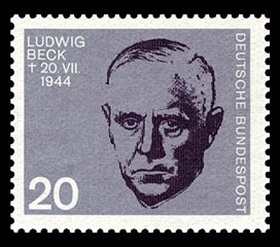 |
Left: Claus von Stauffenberg (b. 1907) was a colonel in the Ersatzheer (Replacement Army) and the driving force behind the July 20, 1944, plot to assassinate Hitler and take control of Germany. For his involvement in the failed bomb plot known as Operation Valkyrie, he was shot in the Bendlerblock (Headquarters of the Army) on the night of July 21, 1944.
![]()
Right: Ludwig Beck (b. 1880) was a German general and Chief of the German General Staff during the early years of the Nazi regime. He became a major leader within the conspiracy against Hitler and would have been provisional head of state had the July 20, 1944, plot succeeded. Beck committed suicide on July 21, 1944.
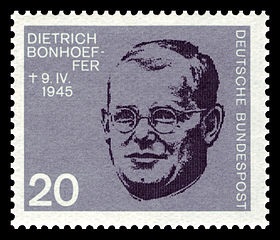 | 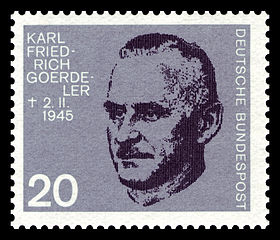 |
Left: Lutheran pastor, theologian, and Nazi dissident, Dietrich Bonhoeffer (b. 1906) was involved in plans by members of Adm. Wilhelm Canaris’ Abwehr (German Military Intelligence) to assassinate Adolf Hitler. He was arrested by the Gestapo in April 1943 and executed by hanging in April 1945, along with Canaris, while they were imprisoned at Flossenbuerg concentration camp in Bavaria.
![]()
Right: A politician, economist, civil servant, and opponent of the Nazi regime, Karl Friedrich Goerdeler (b. 1884) would have served as chancellor of the new government had the July 20, 1944, coup succeeded. After a trial in the notorious People’s Court (Volksgerichtshof), presided over by Judge Roland Freisler, Goerdeler was sentenced to death and executed by hanging on February 2, 1945, at Ploetzensee Prison in Berlin.
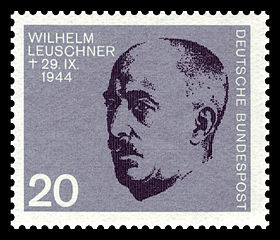 | 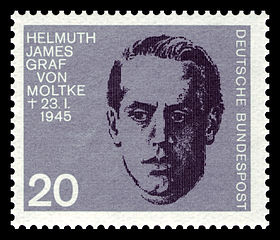 |
Left: In contact with the resistance group around Karl Friedrich Goerdeler, Wilhelm Leuschner (b. 1890) would most likely have become Germany’s vice-chancellor after the July 1944 coup d’état. Arrested in mid-August 1944 and brought before Freisler’s People’s Court, Leuschner was sentenced to death and executed at the end of September 1944 at Ploetzensee Prison in Berlin.
![]()
Right: Helmuth James Graf von Moltke (b. 1907) was a leading human rights advocate in Nazi Germany and a founding member of the Kreisau Circle resistance group. In January 1945, Moltke found himself in Freisler’s People’s Court, along with several of his fellow regime opponents. Moltke was sentenced to death for treason on January 11, 1945, and executed twelve days later at Ploetzensee Prison in Berlin.
Except from Winston Churchill’s First Speech to the House of Commons: “I have nothing to offer but blood, toil, tears, and sweat” (with photographs)
![]()

 History buffs, there is good news! The Daily Chronicles of World War II is now available as an ebook for $4.99 on Amazon.com. Containing a year’s worth of dated entries from this website, the ebook brings the story of this tumultuous era to life in a compelling, authoritative, and succinct manner. Featuring inventive navigation aids, the ebook enables readers to instantly move forward or backward by month and date to different dated entries. Simple and elegant! Click
History buffs, there is good news! The Daily Chronicles of World War II is now available as an ebook for $4.99 on Amazon.com. Containing a year’s worth of dated entries from this website, the ebook brings the story of this tumultuous era to life in a compelling, authoritative, and succinct manner. Featuring inventive navigation aids, the ebook enables readers to instantly move forward or backward by month and date to different dated entries. Simple and elegant! Click 











